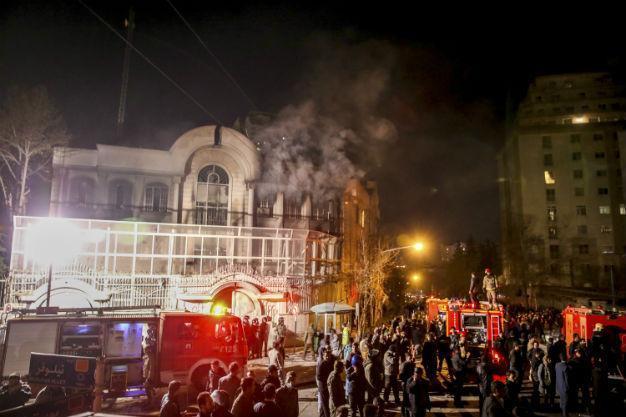Execution of Shiite cleric in Saudi Arabia fuels sectarian tension in Middle East
TEHRAN / RIYADH

AP photo
Tensions between Sunni and Shiite Muslims in the Middle East have flared once again following the execution of a prominent Shiite cleric in Saudi Arabia.Iranian protesters stormed the Saudi embassy in Tehran in the early hours of Jan. 3 and Shiite Muslim Iran’s top leader predicted “divine vengeance” for Saudi Arabia’s execution of Sheikh Nimr al-Nimr.
Demonstrators protesting against the execution broke into the embassy building, smashed furniture and started fires before being ejected by police.
Iranian President Hassan Rouhani condemned the execution as “inhuman”, but also urged the prosecution of “extremist individuals” for attacking the embassy and the Saudi consulate in the northeastern city of Mashhad, state media reported.
Tehran’s police chief said an unspecified number of “unruly elements” had been arrested for attacking the embassy with petrol bombs and rocks. A prosecutor said 40 people had been detained.
Nimr, the most vocal critic of the Saudi dynasty among the country’s Shiite minority, had come to be seen as a leader of the sect’s younger activists, who had tired of the failure of older, more measured leaders to achieve equality with Sunnis.
His execution, along with other Shiite activists and Sunnis accused of involvement in al-Qaeda attacks, sparked demonstrations in Iran, Iraq and Bahrain, as well as among Shiites in Saudi Arabia’s oil-rich Qatif region in eastern Saudi Arabia, where demonstrators denounced the ruling al-Saud dynasty.
France and Germany yesterday condemned the execution of 47 prisoners, including Nimr, and voiced concerns about growing tensions in the Middle East.
France “deeply deplores Saudi Arabia’s execution Saturday of 47 people, including a Shiite religious leader,” the foreign ministry said in a statement, calling on leaders in the region to “do everything to avoid exacerbating sectarian and religious tensions.” France opposes the death penalty “in all places and circumstances,” the statement added.
The condemnation from Paris was echoed in Berlin.
“The death penalty is an inhumane punishment that we reject in all circumstances,” a German Foreign Ministry spokesman told AFP.
Iran’s Supreme Leader Ayatollah Ali Khamenei criticized Saudi Arabia for the second straight day over Nimr’s execution on Jan. 3.
“The unjustly spilled blood of this oppressed martyr will no doubt soon show its effect and divine vengeance will befall Saudi politicians,” state TV quoted Khamenei as saying.
Iran’s Revolutionary Guards had promised “harsh revenge” against the Saudi Sunni royal dynasty for the execution of Nimr, considered a terrorist by Riyadh but hailed in Iran as a hero of the rights of Saudi Arabia’s Shiite minority.
Although most of the 47 men killed in the kingdom’s biggest mass execution for decades were Sunnis convicted of al-Qaeda attacks in Saudi Arabia a decade ago, it was Nimr and three other Shiites, all accused of involvement in shooting police, who attracted most attention in the region and beyond.
The move appeared to end any hopes that the appearance of a common enemy in the form of the Islamic State of Iraq and the Levant (ISIL) would produce some rapprochement between the region’s leading Sunni and Shiite Muslim powers, allied to opposing sides in wars currently raging in Syria and Yemen.
Khamenei’s website carried a picture of a Saudi executioner next to notorious ISIL executioner “Jihadi John,” with the caption “Any differences?”
The Revolutionary Guards said “harsh revenge” would topple “this pro-terrorist, anti-Islamic regime.”
In Iraq, whose Shiite-led government is close to Iran, religious and political figures demanded that ties with Riyadh be severed, calling into question Saudi attempts to forge a regional alliance against Islamic State, which controls swaths of Iraq and Syria.
Iraq’s top Shiite cleric Grand Ayatollah Ali al-Sistani described the executions as an “unjust aggression.”
The U.S. State Department said Nimr’s execution “risks exacerbating sectarian tensions at a time when they urgently need to be reduced,” a sentiment echoed by EU foreign policy chief Federica Mogherini. The U.S. State Department also urged Saudi Arabia to respect and protect human rights.
U.N. High Commissioner for Human Rights Zeid Raad al-Hussein said it was not clear those killed were granted effective legal defense, while the scale of the executions was very disturbing “particularly as some of those sentenced to death were accused of non-violent crimes.”
The execution of 47 people - 45 Saudis, one Egyptian and a man from Chad - was the biggest mass execution for security offences in Saudi Arabia since the 1980 killing of 63 jihadist rebels who seized Mecca’s Grand Mosque in 1979.
The four Shiites had been convicted of involvement in shootings and petrol bomb attacks that killed several police during anti-government protests from 2011-13. More than 20 Shiites were shot dead by the authorities in those protests.
Family members of the executed Shiites have denied they were involved in attacks and said they were only peaceful protesters against sectarian discrimination.
















